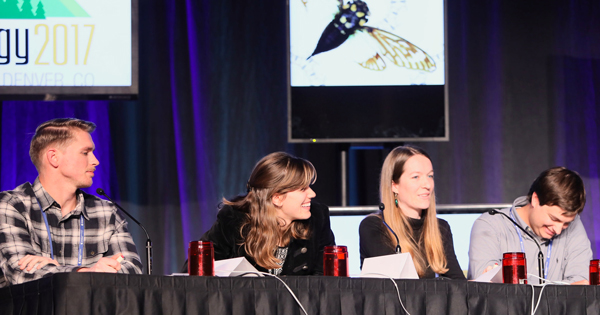


UD team third in national insect trivia competition
Photo by Glenn Cook/Entomological Society of America January 25, 2018
The Entomological Society of America’s National Linnaean Games were in Denver
At the 2017 National Linnaean Games held in Denver, Colorado and hosted by the Entomological Society of America (ESA) as part of their annual meeting, the Entomology Trivia Team at the University of Delaware showed strong, finishing third overall—the highest finish in club history.
The team not only finished third overall but also ousted the perennial powerhouse team from the University of California at Riverside which, Ashley Kennedy, a doctoral level student in the College of Agriculture and Natural Resources, said helped put the club on the map.
“I think it really helped draw attention to how the University of Delaware has a strong entomology program,” Kennedy said.
Entomology is the branch of zoology that deals with insects. According to Smithsonian Magazine, the Linnaean Games are named for Carl Linnaeus, the 18th-century father of binomial nomenclature, in which each species of animal or plant receives a name of two terms of which the first identifies the genus to which it belongs and the second the species itself.
The team at UD this year was made up of all graduate students including Kennedy, Sean Boyle, who just finished his master’s degree at UD, Tyler Hagerty, a master’s level student in the Department of Entomology and Wildlife Ecology, and Danielle Novick, a doctoral level student in the Department of Animal and Food Sciences.
Kennedy noted that the team from Texas A&M that won the competition had undergraduate students on their team and that the club at UD is open to undergraduates as well.
“I hope that will get more undergrads to take part in it. I’ve tried to recruit undergraduates to our team because our practices we have on campus are extremely informal. We meet over lunch and just read trivia questions to each other,” Kennedy said.
The questions include topics such as physiology, taxonomy, and anatomy among others and the team’s coach, Charles Bartlett, associate professor of entomology, reads the questions to team members and takes the time to explain the answers fully.
“I don’t think we would’ve advanced to nationals if we hadn’t been having those practice sessions. It’s a really fun environment,” Kennedy said.
During the tournament, each team has four players and each player has a buzzer, with the player who buzzes in having to answer without conferring with their teammates.
“One thing that people commented on about our team is that we all seemed to be really well rounded where all four players were all buzzing in and answering questions. We got a lot of compliments for having all four team members really engaged,” Kennedy said.
Kennedy’s area of expertise was medical and veterinary entomology and questions focused on the history of the ESA, Boyle’s was parasitoids, Hagerty focused on taxonomy and identification and Novick knew a lot about the plant and insect interaction questions.
Having spent most of his life as an athlete, Boyle enjoyed being able to use his academic learning in a competitive setting.
“It was a fun time. I loved it. In all honesty, my whole life I was always playing against other schools and teams in sports but never in an academic sense so that was a fun new thing for me,” Boyle said. “I know a lot about parasitoids and those types of insects so any time a question would pop up, I would try my best to answer it.”
In addition to participating in the games, Kennedy and Boyle got to present their research and everyone got to interact with colleagues in their fields.
Boyle added that it was a good way to make sure people aren’t overlapping research on similar topics.
“My research is based on how we can control the brown marmorated stink bug using a small little wasp that flies around and lays its own eggs in the stink bug eggs so I went to all the stink bug talks to make sure I wasn’t overlapping research,” said Boyle.
Kennedy added that she received a science policy fellowship through ESA and went to a training workshop where they taught her and others how to engage with legislators and decision makers to advocate for scientifically sound policy.
“That’s going to be something really exciting I get to do over the next two years. We’re going to do a few different trips to Washington D.C. to meet with decision makers on behalf of the ESA,” said Kennedy who works with Doug Tallamy, professor of entomology, looking at bird-insect food webs trying to figure out which insects are the most important in birds’ diets.
“It’s hard to get people interested in insect conservation but a lot of people like birds so if you can make that obvious connection that birds need insects to survive then you can get people interested in insect conservation,” Kennedy said.
Boyle also noted that Kennedy was the team captain and “pretty much ran everything. Scheduled all the stuff, got all the questions together. She was really the captain who brought everyone together so we were just following along and using some of our brain power.”
Kennedy said that she’s been told, “I take it too seriously. But there’s a practical side to it which for some of us it might be the easiest way for us to find funding to go to the meeting. The meeting provides so many great networking opportunities.”
For those interested in joining the Linnaean Games team, reach out to Kennedy at kennedya@udel.edu.
Contact Us
Have a UDaily story idea?
Contact us at ocm@udel.edu
Members of the press
Contact us at 302-831-NEWS or visit the Media Relations website

